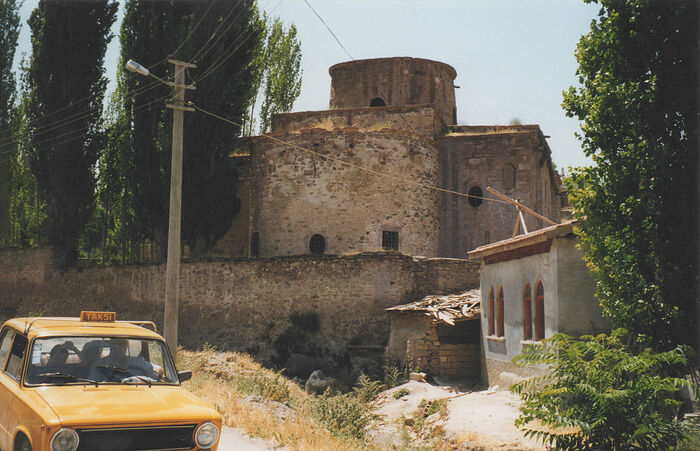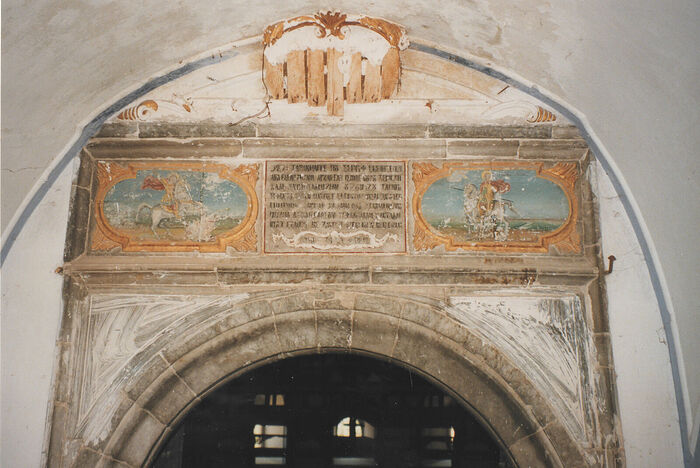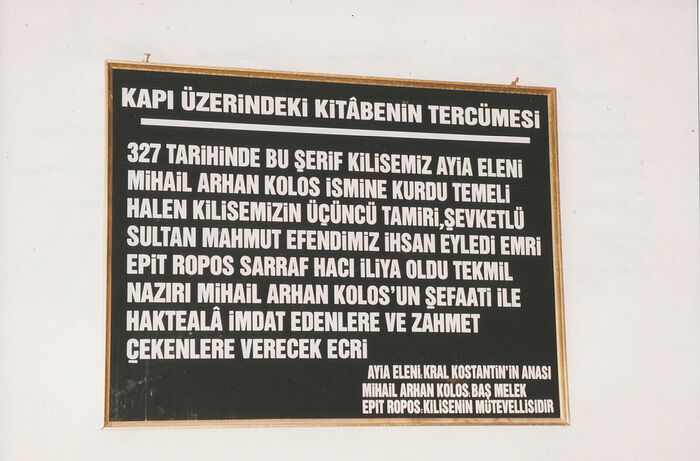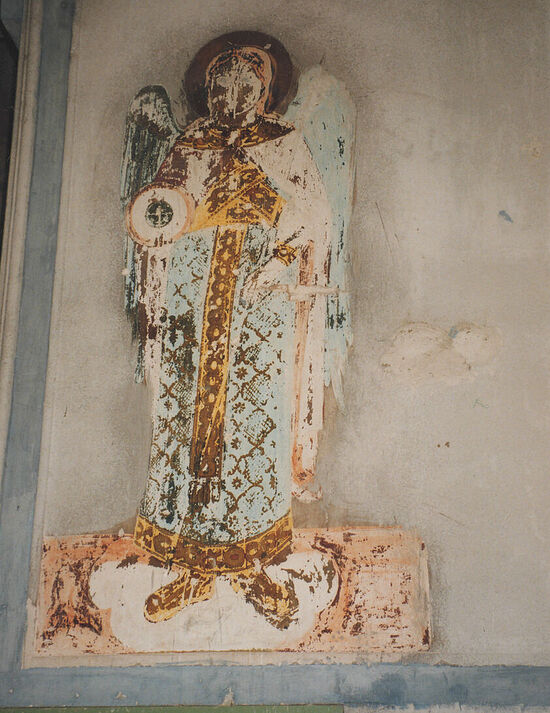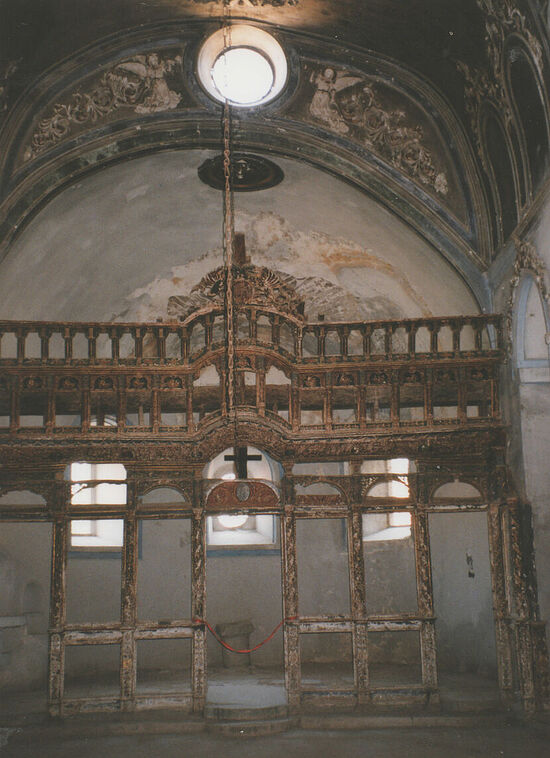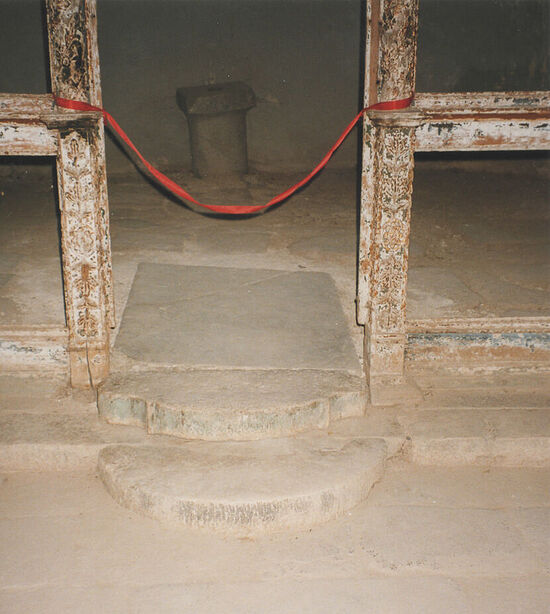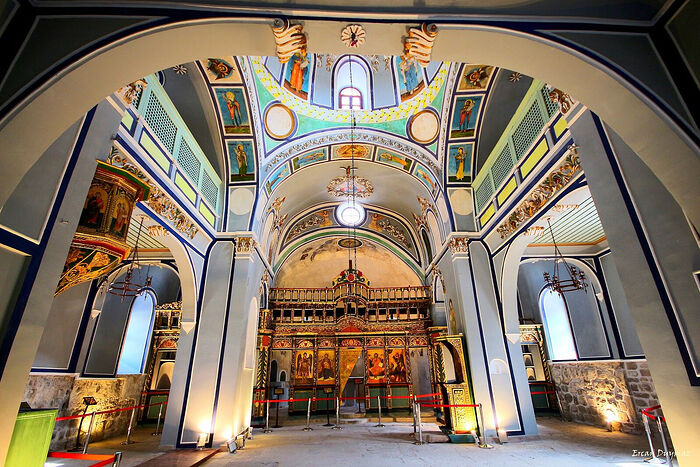On September 2, 1982, Hieromonk Seraphim (Rose) of blessed memory reposed in the Lord after years of monastic labors in the St. Herman of Alaska Monastery, Platina California, which he co-founded. His legacy lives on around the world, and especially in Russia, a country about which he often wrote. The experience of Orthodox believers in Russia was a major theme in Fr. Seraphim's lectures and writings, and he often used them to illustrate important points concerning contemporary Orthodox life. Although the following lecture was presented in 1981, before the fall of communism in Russia and the collapse of the Soviet Union—events essentially described in the prophecies Fr. Seraphim cites—and much else has happened which Fr. Seraphim did not live to see, the message of his lecture continues to be relevant.

Every Orthodox Christian is placed between two worlds: this fallen world where we try to work out our salvation, and the other world, heaven, the homeland towards which we are striving and which, if we are leading a true Christian life, gives us the inspiration to live from day to day in Christian virtue and love.
But the world is too much with us. We often, and in fact nowadays we usually forget the heavenly world. The pressure of worldliness is so strong today that we often lose track of what our life as a Christian is all about. Even if we may be attending church services frequently and consider ourselves “active” church members, how often our churchliness is only something external, bound up with beautiful services and the whole richness of our Orthodox tradition of worship, but lacking in real inner conviction that Orthodoxy is the faith that can save our soul for eternity, lacking in real love for and commitment to Christ, the incarnate God and Founder of our faith. How often our church life is just a matter of habit, something we go through outwardly but which does not change us inwardly, does not make us grow spiritually and lead us to eternal life in God.
OUR TIMES
We live in the times which our Lord warned us about in the Gospel, when “the love of many shall grow cold” [Matt 24:12], in the latter times when the Christian Gospel which was received with such fervor by the first Christians has become only one small part of the worldly life that most of us lead, instead of the center and meaning of our life—which is what it should be if we realized what our faith really is. Orthodox Christianity, as a burning faith which we are not ashamed to confess and to have as the most precious thing in our life, is to a great extent in a state of decline and retreat in the world today.
But ironically—and providentially—as Orthodoxy has seemed to retreat, Russia (or rather, the Soviet Union, the atheist regime that has enslaved the Russian land) has advanced and now has a leading, perhaps the leading position in the world history of our times. Therefore, what is happening in the Soviet Union today is looked to with great interest by the rest of the world. And significantly, a good part of what is happening in the Soviet Union today concerns the life of the real Russia—Orthodox Russia. The Orthodox revival in Russia today is closely bound up with the future of the Russian land.
In the 19th and early 20th century Russia before the Revolution of 1917, there were prophecies of spiritual men not only concerning the coming of atheism to Russia and the epoch of blood and slavery which it introduced into the world, but also concerning what would happen to Russia after this epoch, if the Orthodox Russian people would repent of the sins which produced it.
Let us, therefore, look at these prophecies and the way they are bound up with what is happening in Russia today. Let us look, not from the superficial point of view of the popular newsmagazines, but deeper, and try to see something of what is happening to the soul, to the heart of Russia, and what may be expected there according to these prophecies and according to our knowledge of the more general prophecies concerning what is to happen before the end of the world.
THE END OF THE WORLD IN CHRISTIAN PROPHECY
Before turning specifically to the prophecies about Russia, I would like to summarize the general Orthodox teaching on what is to happen just before the end of the world. This will give us a context in which to place the prophecies regarding the future of Russia.
The events before the end of the world are described in a number of places in holy Scripture: the 24th chapter of Matthew and parallel places in the other Gospels; most of the book of the Apocalypse, especially chapter 8 and onwards; the second chapter of II Thessalonians; II Peter, chapter 3; several chapter of the book of Daniel; and other passages.
The Apocalypse describes these events in a series of visions: some bright and positive, relating to the fulfillment of God's justice and the salvation of His chosen ones; and some dark and negative, relating to the terrible plagues that will come on earth for the sins of mankind. Sometimes we today emphasize the dark and negative side, seeing the increase of evil around us; but that comes from our faintheartedness and worldliness—we must look at the whole picture.
As the time of the end of this world comes near, it is true that there will be a time of tribulation such as the world has never seen [Matt 24:21]: there will be famines, plagues, earthquakes, wars and rumors of wars, persecutions, false prophets and false Christs, and the love of many (including Christians) will grow cold. But at the same time the Gospel will be preached to all nations, and those who endure to the end with the aid of Christ will be saved.
The evil and false religion in the world will culminate in the reign of Antichrist, a world ruler who will seem to bring peace out of the world disorder and will seem to be Christ come again to earth, reigning from the restored Temple in Jerusalem.
But there will be those who see through the deception. In particular, two Old Testament prophets who did not die will return to earth—Elijah to convert the Jews, and Enoch to preach to the other nations. The short reign of Antichrist—only three and a half years—will end in new disorders and wars, in the midst of which Christ Himself will come from heaven, preceded by the sign of the Cross, and this world will be consumed by fire and totally renewed, at the same time that the bodies of the dead will arise from the tomb and be rejoined to their souls in order to stand before God's final judgment. Now, with this general background of the events of the last times, let us look at the prophecies regarding Russia.
THE FUTURE OF RUSSIA
In 19th-century Russia a number of prophets—and even some far-seeing laymen like Dostoyevsky—foresaw the Revolution which would come upon Russia as a result of unbelief, worldliness, and a purely formal attitude towards Orthodoxy, devoid of the burning and self-sacrificing faith that Orthodoxy demands. Some saw this in general terms as a terrible disaster ready to overtake the Russian land, as did Bishop Theophan the Recluse when he looked at the lack of true Christian faith in so many people and exclaimed: In a hundred years, what will be left of our Orthodoxy?
Others saw more specifically the frightful Revolution which would spread to the entire world. Thus, St. John of Kronstadt said, in a sermon delivered in 1904: “Russia, if you fall away from your faith, as many of the intellectual class have already fallen away, you will no longer be Russia or Holy Russia. And if there will be no repentance in the Russian people—then the end of the world is near. God will take away the pious Tsar and will send a whip in the person of impious, cruel, self-appointed rulers, who will inundate the whole earth with blood and tears” [Father John of Kronstadt, 50th Anniversary Book, Utica, NY, 1958, p.164].
This is the state in which the world now finds itself, with nearly half of it drenched in blood and enduring tyranny which began in 1917 with the Russian Revolution. Is there any hope for deliverance, or will atheism simply conquer the whole world and set up the Kingdom of Antichrist? We have good reason to doubt that future events will be as simple as this, both because the very country that began the reign of atheism, Russia, is now undergoing a religious awakening which is already a hindrance to the spread of atheism, and also because Antichrist, according to Orthodox prophecy, will not be simply an atheist tyrant like Stalin, but a religious figure who will persuade rather than compel people to accept him.
The holy men alive in Russia at the beginning of the Revolution were aware of the apocalyptic nature of this event and knew that it would be a long and difficult trial for the Russian land. But they also foresaw that there would be and end to this trial.
The Elder Alexius of the Zosima Hermitage, who was the monk who drew the lot that elected Patriarch Tikhon, heard people crying out in church in the Chudov monastery (this was in the early, confused months of the Revolution): “Our Russia is lost, Holy Russia is lost!” To this he answered: “Who is it that is saying that Russia is lost, that she has perished? No, no, she is not lost, she has not perished and will not perish—but the Russian people must be purified of sin through great trials. One must pray and fervently repent. But Russia is not lost and she has not perished” [Orthodox Russia, 1970, no. 1, p. 9].
Starets Anatole the Younger of Optina, in the very first days of the Revolution, in February 1917, made a prophecy in the form of a vivid picture of the future of Russia: “There will be a storm. And the Russian ship will be smashed to pieces. But people can be saved even on splinters and fragments. And not everyone will perish. One must pray, everyone must repent and pray fervently. And what happens after a storm? ...There will be a calm.’ At this everyone said: ‘But there is no more ship, it is shattered to pieces; it has perished, everything has perished.’ ‘It is not so,’ said Batiushka. ‘A great miracle of God will be manifested. And all the splinters and fragments, by the will of God and His power, will come together and be united, and the ship will be rebuilt in its beauty and will go on its own way as foreordained by God. And this will be a miracle evident to everyone.” [Orthodox Russia, 1970, no. 1, p. 9].
Elder Barnabas of the Gethsemane Skete spoke before the Revolution of the disaster coming upon Russia and the cruel persecutions against the Orthodox Faith. He said: “Persecutions against the faith will constantly increase. There will be unheard-of grief and darkness, and almost all the churches will be closed. But when it will seem to people that it is impossible to endure any longer, then deliverance will come. There will be a flowering. Churches will even begin to be built. But this will be a flowering before the end” [private letter from N. Kieter].
Schema-monk Aristocleus, not long before his death in August 1918, said that “now we are undergoing the times before Antichrist, but Russia will yet be delivered. There will be much suffering, much torture. The whole of Russia will become a prison, and one must greatly entreat the Lord for forgiveness. One must repent of one's sins and fear to do even the least sin, but strive to do good, even the smallest. For even the wing of a fly has weight, but God's scales are exact. And when even the smallest of good in the cup overweighs, then will God reveal His mercy upon Russia. Ten days before the end (of his life) he said that the end would come through China. There will be and extraordinary outburst and a miracle of God would be manifested. And there will be an entirely different life, but all this will not be for long” [Orth. Russia, 1969, #21, p. 3].
Elder Nectarius of Optina in the 1920’s prophesied: “Russia will arise, and materially it will not be wealthy. But in spirit it will be wealthy, and in Optina there will yet be seven luminaries, seven pillars” [I.M. Kontzevich, Optina Monastery and its Epoch, Jordanville, 1973, p.538].
Interestingly, St. John of Kronstadt also prophesied that the deliverance of Russia would come from the East [I.K. Sursky, Father John of Kronstadt, Belgrade, 1942, vol. 2, p. 24—Excerpts from this work are in preparation for publication by the St. John of Kronstadt Press].
Archbishop Theophan of Poltava summed up in the 1930’s the prophecies which he had received from such elders as these: “You ask me about the near future and about the last times. I do not speak on my own, but give the revelation of the Elders: The coming of Antichrist draws nigh and is very near. The time separating us from him should be counted a matter of years and at most a matter of some decades. But before the coming of Antichrist Russia must yet be restored—to be sure, for a short time. And in Russia there must be a Tsar forechosen by the Lord Himself. He will be a man of burning faith, great mind and iron will. This much has been revealed about him. We shall await the fulfillment of what has been revealed. Judging by many signs it is drawing nigh, unless because of our sins the Lord God shall revoke, shall alter what has been promised. According to the witness of the word of God, this also happens” [The Orthodox Word, 1969, no. 4, p. 194].
Thus we may see in the prophecies of these God-inspired men in the early part of this century a definite expectation of the restoration of Holy Russia, and even of an Orthodox Tsar, for a short time not long before the coming of Antichrist and the end of the world. This will be something miraculous and not an ordinary historical event. But at the same time it is something that depends upon the Russian people themselves, because God always acts through the free will of man. Just as Ninevah was spared when the people repented, and Jonah’s prophecies about its destruction proved false, so also the prophecies of the restoration of Russia will prove false if there is no repentance in the Russian people.
Archbishop John Maximovitch of blessed memory, whose tomb is in the very cathedral where services were held this morning, reflected deeply on the meaning of the Russian Revolution and the exile of so many Russian people. In his report to the All-Diaspora Sobor in Yugoslavia in 1938 he wrote:
“The Russian people as a whole has performed great sins which are the cause of the present misfortunes: the specific sins are oath-breaking and regicide. The public and military leaders renounced their obedience and loyalty to the Tsar even before his abdication, forcing the latter from the Tsar, who did not desire bloodshed within the country; and the people openly and noisily greeted this deed, and nowhere did it loudly express its lack of agreement with it.... Those guilty of the sin of regicide are not only those who physically performed it, but the whole people which rejoiced on the occasion of the overthrow of the Tsar and allowed his abasement, arrest and exile, leaving him defenseless in the hands of the criminals, which fact in itself already predetermined the end. Thus, the catastrophe which has come upon Russia is the direct consequence of the terrible sins, and the rebirth of Russia is possible only after cleansing from them. However, up to this time there has been no genuine repentance, the crimes that have been performed have clearly not been condemned, and many active participants in the Revolution continue even now to affirm that at that time it was not possible to act in any other way. In not expressing a direct condemnation of the February Revolution, the uprising against the Anointed of God, the Russian people continue to participate in the sin, especially when they defend the fruits of the Revolution” [The Orthodox Word, 1973, no. 50, p. 91].
Of course, regicide—the killing of the anointed Tsar—is not the only sin that lies upon the conscience of the Orthodox Russian people. This crime is, as it were, a symbol of the falling away of Russia from Christ and true Orthodoxy—a process that took up most of the 19th and 20th centuries, and only now is perhaps beginning to be reversed. It is most interesting that in Russia itself today the question of the glorification of the Tsar together with the other New Martyrs is bound up with the lifting of the literal curse which has lain upon the Russian land since his martyrdom.[1] […]
It is too simple, of course, to say that the glorification of the New Martyrs, including the Royal Family, will bring about the restoration of Holy Russia. But if the Orthodox people, both in Russia and in the Diaspora, would receive this act with all their hearts, and use it as an opportunity to repent deeply of their sins, there is no calculating the impact it might have on Russia.
One great prophecy of the future of Russia was known to only a few before the Revolution; t was so daring that the church censor would not allow it to be printed. It was found in the same collection of manuscripts of Motovilov that gave the world the famous “Conversation” of St. Seraphim on the acquisition of the Holy Spirit. This prophecy, which has now appeared in several printings in the last decade, concerns the literal resurrection of St. Seraphim before the end of the world. Here is what St. Seraphim told to Motovilov:
“Many times I heard from the mouth of the great God-pleaser, the Elder, Father Seraphim, that he would not lie in Sarov with his flesh. And behold, one I (Motovilov) dared to ask im: ‘Batiushka, you deign to say all the time that with your flesh you will not lie in Sarov. Does this mean that the monks of Sarov will give you away?’
“ ‘Your godliness, the Lord God has ordained that I, humble Seraphim, should live considerably longer than a hundred years. But since toward that time the bishops will become so impious that in their impiety they will surpass the Greek bishops of the time of Theodosius the Younger, so that they will no longer even believe in the chief dogma of the Christian faith: therefore it has been pleasing to the Lord God to take me, humble Seraphim, from this temporal life until the time, and then resurrect me; and my resurrection will be as the resurrection of the Seven Youths in the cave of Ochlon in the days of Theodosius the Younger.’
“Having revealed to me this great and fearful mystery, the great Elder informed me that after his resurrection he would go from Sarov to Diveyevo and there he would begin the preaching of world-wide repentance. For this preaching, and above all because of the miracle of resurrection, a great multitude of people will assemble from all the ends of the earth; Diveyevo will become a lavra, Vertyanova will become a city, and Arzamas a province. And preaching repentance in Diveyevo, Batiushka Seraphim will uncover four relics in it, and after uncovering them he himself will lie down in their midst. And then soon will come the end of everything.
“Another time St. Seraphim spoke to Motovilov concerning the spiritual state of the last Christians who will remain faithful to God before the end of the world:
“ ‘And in the days of that great sorrow, of which it is said that no flesh would be saved unless, for the sake of the elect, those days will be cut short—in those days the remnant of the faithful are to experience in themselves something like that which was experienced once by the Lord Himself when He, hanging upon the Cross, being perfect God and perfect Man, felt Himself so forsaken by His Divinity that He cried out to Him: My God, My God, why hast Thou forsaken Me? The last Christians also will experience in themselves a similar abandonment of humanity by the grace of God, but only for a very short time, after the passing of which the Lord will not delay immediately to appear in all His glory, and all the holy Angels with Him. And then will be performed in all its fulness everything fore-ordained from the ages in the pre-eternal counsel (of the Holy Trinity)’” [The Orthodox Word, 1973, no. 50, pp. 123-4].
This prophecy was never printed in Russia, and yet it is known there today. In a letter from a priest, published in the first issue of the periodical Nadezhda, describing his visit to Sarov and Diveyevo and his discovery there that Holy Russia was still alive, and that nuns from the Diveyevo Convent (which was closed in 1926) still live there, there is this prophecy from an old woman, Evdokia, who had just received Holy Communion. Addressing the priest, she said: “Soon, soon, here in Diveyevo, there will be a celebration. Now it is not years, not months, but days and hours that remain until the opening of the monastery and the manifestation of four relics: those of the Saint, the Foundress (of Diveyevo) Alexandra, Matushka Martha, and Blessed Evdokeyushka, who was tortured and killed by the atheists.... The Saint commands me: Say to him and no one else...that soon, soon, both the monastery and the relics will be opened... He commands me to tell you that without fail you must come here for the opening of the church and the relics” [Nadezhda, 1977, no. 1, p. 148].
Of the fact that Holy Russia is still alive despite the continued reign of atheism in Russia, we have the testimony now of many observers in Russia itself. Here is what Gennady Shimanov says:
“Holy Russia cannot be buried, it cannot pass away; it is eternal and victorious, and it is precisely to it that the final word in the history of our people will belong.... Holy Russia went away only from the surface of contemporary life, but it continues to live in its hidden depths, germinating until the time, so that in the time pleasing to God, having survived the winter, it will again break through to the surface and adorn the face of the Russian land, which has been so cruelly lashed by fiery and icy storms” [The Orthodox Word, 1973, no. 50, p. 98].
RUSSIA'S MESSAGE TO THE WORLD
In the book which most thoroughly describes the events to occur at the end of the world, the Apocalypse of St. John the Theologian, at the opening of the seventh seal, which precedes the final plague to come upon mankind; it is said that there was silence in heaven for the space of half an hour [Apoc 8:1]. Some have interpreted this to mean a short period of peace before the final events of world history—namely, the short period of the restoration of Russia, when the preaching of world-wide repentance will begin with Russia—that “new, ultimate word” which even Dostoyevsky hoped Russia would give to the world [Pushkin Speech, The Diary of a Writer, tr. Boris Brasol, New York, George Braziller, 1954, p. 980]. Under present world conditions, when the events of one country are known to the whole world almost instantly, and when Russia, cleansed by the blood of its martyrs, indeed has a better chance than any other country to awake from the sleep of atheism and unbelief—we can already conceive the possibility of such an event. As Father Dimitry Dudko and others have said, it cannot be that the blood of Russia's innumerable martyrs will be in vain; undoubtedly it is the seed of the last great flowering of true Christianity.
But it is easy to become lost in dreams of the future world. We should be aware of what is to happen at the end of the world, and of what may happen in Russia. But spiritual events such as the resurrection of Russia depend upon each individual soul. This seven will not happen without the participation of the Orthodox people—our repentance and struggle. And this involves not only the people of Russia itself—it involves the whole of the Russian Diaspora, and all the Orthodox people of the world.
Archbishop John, in the same report to the All-Diaspora Sobor of 1938 which I have already quoted, speaks of the apocalyptic mission of the Russian people outside of Russia:
“In chastising, the Lord at the same time also shows the Russian people the way to salvation by making it a preacher of Orthodoxy in the whole world. The Russian Diaspora has made all the ends of the world familiar with Orthodoxy; the mass of Russian exiles, for the most part, is unconsciously a preacher of Orthodoxy.... To the Russians abroad it has been granted to shine in the whole world with the light of Orthodoxy, so that other peoples, seeing their good deeds, might glorify our Father Who is in heaven, and thus obtain salvation for themselves.... The Diaspora will have to be converted to the path of repentance and, having acquired forgiveness for itself through prayer to God and through being reborn spiritually (will) become capable also of giving rebirth to our suffering homeland” [The Orthodox Word, 1973, no. 50, pp. 92, 94].
Thus the Russians abroad by their living the true life of Orthodoxy, should be already preparing the way for St. Seraphim's preaching of world-wide repentance. To some extent this is happening, and one can even begin to see, parallel to the Orthodox revival in Russia, a genuine Orthodox awakening in America and other lands outside of Russia.
But it all depends on each on of us: if we are awakening to true Orthodox life, then Holy Russia will be restored; if we are not, then God can withdraw His promises.
Archbishop John ended his report to the 1938 Sobor with a prophecy and a hope that there will be a true Pascha in Russia that will shine forth to the whole world before the very end of all things and the beginning of the universal Kingdom of God:
“Shake away the sleep of despondency, O sons of Russia! Behold the glory of her suffering and be purified; wash yourselves from your sins! Be strengthened in the Orthodox Faith, so as to be worthy to dwell in the dwelling of the Lord and to settle on His holy mountain! Leap up, leap up, arise, O Russia, you who from the Lord's hands have drunk the cup of His wrath! When your suffering shall have ended, your righteousness shall go with you and the glory of the Lord shall accompany you. The peoples shall come to your light, and kings to the shining which shall rise upon you. Then Lift up your eyes and see: behold your children come to you from the West and the North and the Sea and the East, blessing you in Christ forever. Amen” [Ibid, p. 94].
This address, delivered at the Orthodox Youth Conference in San Francisco in 1981, was originally published in The Orthodox Word, Nos. 100-101 (1981; vol. 17, nos. 5-6), pp. 205-217.



